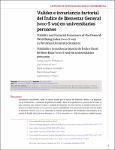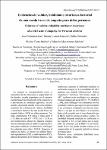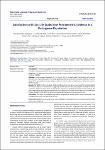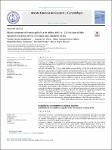Validity and factorial invariance of the general well-being index (Who-5 wbi) in peruvian university students [Validade e invariância fatorial do índice geral de bem-estar (Who-5 wbi) em universitários peruanos] [Validez e invariancia factorial del índice de bienestar general (Who-5 wbi) en universitarios peruanos]
| dc.contributor.author | Caycho-Rodríguez, Tomás | |
| dc.contributor.author | Ventura-León, José | |
| dc.contributor.author | Azabache-Alvarado, Karla | |
| dc.contributor.author | Reyes-Bossio, Mario | |
| dc.contributor.author | Cabrera-Orosco, Isabel | |
| dc.date.accessioned | 2021-05-29T13:35:42Z | |
| dc.date.available | 2021-05-29T13:35:42Z | |
| dc.date.issued | 2020-05-11 | |
| dc.identifier.citation | Caycho-Rodríguez, T. ...[et al]. (2020). Validity and factorial invariance of the general well-being index (Who-5 wbi) in peruvian university students [Validade e invariância fatorial do índice geral de bem-estar (Who-5 wbi) em universitários peruanos] [Validez e invariancia factorial del índice de bienestar general (Who-5 wbi) en universitarios peruanos]. Revista Ciencias de la Salud, 18(3), 1-15. https://doi.org/10.12804/revistas.urosario.edu.co/revsalud/a.9797 | es_PE |
| dc.identifier.uri | https://hdl.handle.net/11537/26639 | |
| dc.description.abstract | ABSTRACT Introduction: Owing to its importance in the development and evaluation of health policies in favor of the general population, there is currently a greater interest in the study of well-being. Therefore, a valid and reliable measurement of well-being is necessary. In this context, this study evaluated the evidence of validity based on the internal structure, reliability, and factor invariance by sex of the General WellBeing Index (who-5 wbi). Materials and Methods: A total of 499 university students (female = 271; male = 228) from the city of Trujillo, Peru, participated in the study. A confirmatory factor analysis, reliability by internal consistency, and factor invariance by sex were performed using a multigroup analysis. Results: The confirmatory factor analysis indicated that the 5-dimensional model with 5 correlated errors of items 1 and 4 presented a good fit (χ² = 9.667 [gl = 4], p > 0.05; χ²/gl = 2.416; cfi = 0.994; rmsea = 0.053 [ic90% 0.006–0.097]; srmr = 0.018). In addition, acceptable reliability (ω = 0.758) and factor invariance by sex were reported. Conclusion: The who-5 wbi demonstrated empirical evidence in favor of validity based on internal structure, reliability of scores, and factor invariance that allow for a useful and rapid instrument for measuring subjective well-being in university students. | es_PE |
| dc.format | application/pdf | es_PE |
| dc.language.iso | spa | es_PE |
| dc.publisher | Universidad del Rosario | es_PE |
| dc.rights | info:eu-repo/semantics/openAccess | es_PE |
| dc.rights | Atribución-NoComercial-CompartirIgual 3.0 Estados Unidos de América | * |
| dc.rights.uri | https://creativecommons.org/licenses/by-nc-sa/3.0/us/ | * |
| dc.source | Universidad Privada del Norte | es_PE |
| dc.source | Repositorio Institucional - UPN | es_PE |
| dc.subject | Felicidad | es_PE |
| dc.subject | Salud mental | es_PE |
| dc.subject | Psicometría | es_PE |
| dc.subject | Estudiantes universitarios | es_PE |
| dc.subject | Perú | es_PE |
| dc.title | Validity and factorial invariance of the general well-being index (Who-5 wbi) in peruvian university students [Validade e invariância fatorial do índice geral de bem-estar (Who-5 wbi) em universitários peruanos] [Validez e invariancia factorial del índice de bienestar general (Who-5 wbi) en universitarios peruanos] | es_PE |
| dc.type | info:eu-repo/semantics/article | es_PE |
| dc.publisher.country | CO | es_PE |
| dc.identifier.journal | Revista Ciencias de la Salud | es_PE |
| dc.subject.ocde | https://purl.org/pe-repo/ocde/ford#5.01.02 | es_PE |
| dc.description.sede | Los Olivos | es_PE |
| dc.identifier.doi | https://doi.org/10.12804/revistas.urosario.edu.co/revsalud/a.9797 |







